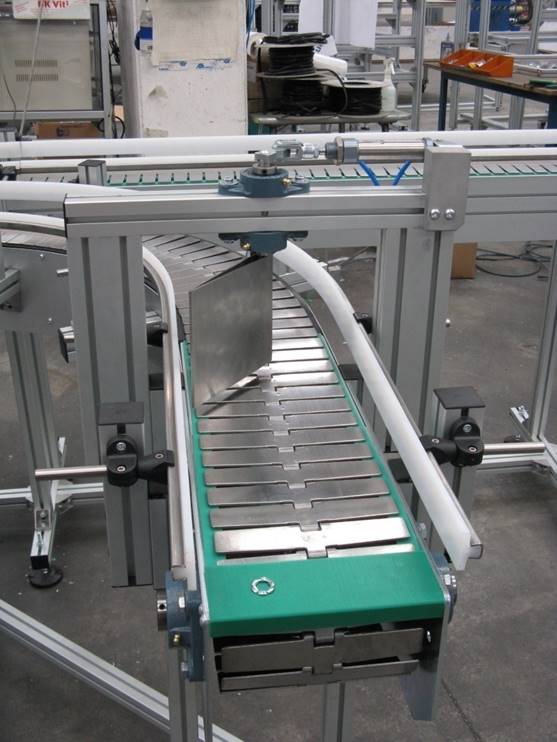How can Industrial Conveyors smoothen material handling in Industry?
08/Apr/2024
A vital component of many businesses across different
industrial sectors, including manufacturing, warehousing, and
distribution is material handling. To ensure customer needs
are fulfilled while cutting down on expenses and maintaining
production needs, efficient material handling is one crucial
need. The
industrial conveyor system
is the foundation of efficient material handling operations.
Within a commercial facility, automated devices called
industrial conveyors move goods and materials from one area or
location to another. Their complexity varies from standard
belt conveyors to more sophisticated systems with rollers,
conveyor belts, and even robotic parts. Conveyor systems'
primary objective is to do away with manual handling, which
lowers labour costs and increases safety.
The design of the conveyor systems facilitates the movement of
objects from one place to another. The significance of
conveyor systems is undeniable. Such systems are designed to
save time and human labour. Hence, choosing the appropriate
design for any conveyor system matters. The designs depend on
the quantity of objects, whether they are too bulky or heavy.

Enhanced Productivity and Efficiency
The capacity of industrial conveyors to increase
productivity and efficiency is one of its most important
advantages. Today, the effectiveness of these systems has
gained prominence across different industrial sectors. With
features ranging from flexibility of usage to adaptability,
manufacturers create conveyor systems that are adaptable
with ease and their usage to a range of functions and
industries.
Conveyors free up the need for human laborers to concentrate
on higher-value duties like quality assurance, assembly, and
customer support by automating the transportation of goods.
Profitability and output can rise significantly due to this
change in focus.
Conveyor systems can also be designed to handle large
volumes of material correctly and swiftly. To develop
effective material flow channels, they can be linked with
other automation technologies like robotics and computerized
inventory management systems. This degree of automation can
help guarantee that resources are always available when and
where needed to decrease wastage and even minimize errors to
a great extent.
Lower Labour Costs and Enhanced Security
The lower labour expenses and increased safety provided by
industrial conveyors are the two most important benefits.
Manual material handling is physically taxing and increases
the risk of errors, worker fatigue, and injury. Conveyors
remove the need for labour-intensive, repetitive manual
tasks by automating the transportation of items. This lowers
labour expenses while also making the workplace safer.
Safety measures like emergency stop systems and sensors are
built into industrial conveyors to guard against mishaps and
safeguard personnel. Conveyors also lessen the need for
labour-intensive hand lifting and hauling, which helps avoid
musculoskeletal disorders—a significant occupational
hazard—at work.
Scalability and Flexibility
Industrial conveyors are useful for a range of industries
because of their flexibility and scalability despite being
frequently connected with large-scale manufacturing and
storage operations. Conveyor systems can be enlarged or
altered to accommodate changing business demands and can be
tailored to handle material kinds.
For instance, if the assembly process changes, a conveyor
system built for a production line that puts products
together in a specific order can be readily adjusted.
Similar to this, a warehouse's usage of conveyors for order
fulfilment can be adjusted up or down in response to
variations in seasonal demand.
Environmental Aspects to Consider
Apart from its operational advantages, industrial conveyors
have the potential to promote environmental sustainability.
Conveyors can assist in lowering wastage and energy usage in
comparison to manual procedures by automating material
handling. To reduce their environmental impact, they can
also be constructed with materials and components that are
energy-efficient.
Certain sophisticated conveyor systems additionally include
material recycling or reuse, thereby endorsing environmental
behaviours even more. With the growing importance of
environmental responsibility, conveyors provide an
opportunity for enterprises to enhance their green
credentials.
Industrial Conveyors: The Secret to Efficient Material Processing
Material handling in many kinds of businesses is greatly streamlined using industrial conveyors. They provide flexibility, increase safety, lower labour costs, and improve efficiency by automating the transportation of products. Conveyors are an indispensable component of many contemporary manufacturing and warehousing operations due to their capacity to handle enormous amounts of goods precisely and swiftly.
Conclusion
Today, the market provides industrial conveyors of various types, starting from slats, chutes, chains, rollers, buckets, and belts. In addition to that, you can also select from a range of variations in conveyors with built-in slopes, angles, and turns. The role of conveyors is expected to grow increasingly crucial as industries continue to change and face pressure to become more sustainable and energy efficient. Businesses can obtain a competitive edge and make sure they are set up for future success by implementing the conveyor technology. With different options in terms of designs and energy efficiency, you can choose systems that suit your workplace needs with precision. Invensys Engineers is one of the major industrial conveyor manufacturers in India. Please dial us if you wish to automate your material handling system.